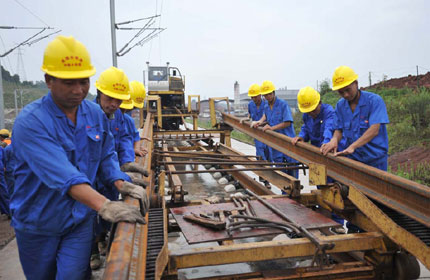Peaceful coexistence bedrock for peace and development
Updated: 2014-07-03 11:17
By Li Yang (chinadaily.com.cn)
|
|||||||||||
The Five Principles of Peaceful Coexistence were, are and will continue to be the foundation for China’s diplomatic works, says an article in 21st Century Business Herald. Excerpts:
China, India and Myanmar celebrated the 60th anniversary of the Five Principles of Peaceful Coexistence in Beijing last week.
After 60 years, the principles of mutual respect for the integrity of sovereignty and territory, mutual nonaggression, mutual nonintervention in internal affairs, equality and mutual benefit, and peaceful coexistence, have been recognized as conventional codes for dealing with international relations.
The Five Principles are China’s precious diplomatic policy resources and a heritage that should play a larger role in serving China’s long-term target of building a peaceful environment for development.
The contents of the Five Principles have not changed over the past 60 years. But the changes of time inject new meaning into them.
Under the principles, developing countries quickly united after World War II, and that unity was crucial in their joint fight for equality and respect in a world order largely defined by the West.
After China’s reform and opening up in the late 1970s, the Five Principles became a new foundation for China, together with the other developing countries, to strive for a new global order of fairness and equality, and to fight against hegemony.
Since China replaced Japan as the world’s second-largest economy two years ago, the emerging economies and markets have surged as an increasingly important new power to reshape the world. The Five Principles remain the bedrock for Chinese decision-makers to tackle new challenges in national security, energy security, trade and diplomatic frictions and public diplomacy.
In a multipolar world, China keeps good relations with many countries and makes efforts to undertake its international responsibilities to promote world peace and stability. With the Five Principles deeply rooted in China’s diplomatic works, China demonstrates great restraint and patience in dealing with territorial disputes with its neighbors.
The Five Principles will continue to be the foundation for China’s progress in the future, and continue to promote peace and development in the world.
Related Stories
Five Principles of Peaceful Coexistence serve as guiding light in int'l diplomacy 2014-06-27 13:42
Peaceful coexistence a cornerstone of foreign policy 2014-05-28 07:09
China, Germany underscore peaceful coexistence, common development 2014-03-29 07:59
Chief of island's mainland affairs seeks 'peaceful coexistence' 2014-02-13 07:09
Today's Top News
Gambling costs World Cup fans their lives
US supports Ukraine's decision to suspend ceasefire
It's all about making a spectacle
China's Q2 GDP to grow 7.5%: report
Palace Museum feeling the squeeze of visitors
Myanmar pagoda replica given to China
US sends 300 more troops to Iraq over concerns
Hong Kong at the crossroads
Hot Topics
Lunar probe , China growth forecasts, Emission rules get tougher, China seen through 'colored lens', International board,
Editor's Picks

|

|

|

|

|

|





